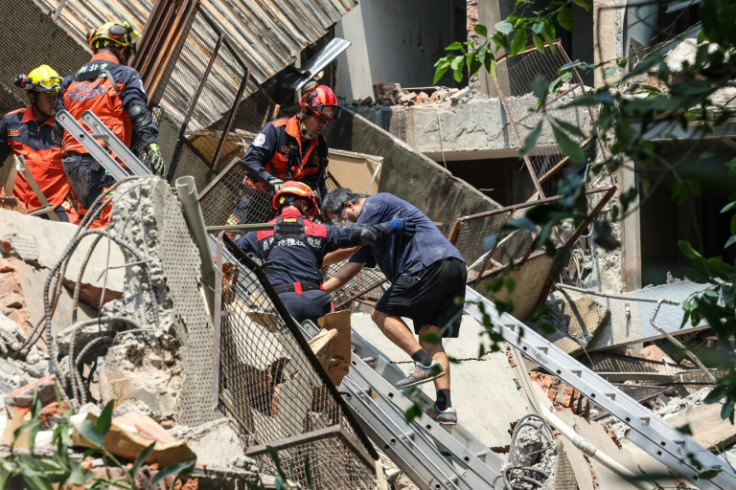Seven Dead, Hundreds Injured In Most Powerful Taiwan Quake In 25 Years

At least seven people were killed and more than 700 injured Wednesday by a powerful earthquake in Taiwan that damaged dozens of buildings and prompted tsunami warnings that extended to Japan and the Philippines before being lifted.
Officials said the quake was the strongest to shake the island in decades, and warned of more tremors in the days ahead.
"The earthquake is close to land and it's shallow. It's felt all over Taiwan and offshore islands," said Wu Chien-fu, director of Taipei's Central Weather Administration's Seismology Center.
Strict building regulations and widespread public disaster awareness appear to have staved off a major catastrophe for the earthquake-prone island, which lies near the junction of two tectonic plates.
Wu said the quake was the strongest since a 7.6-magnitude struck in September 1999, killing around 2,400 people in the deadliest natural disaster in the island's history.
Wednesday's magnitude-7.4 quake hit just before 8:00 am local time (0000 GMT), with the United States Geological Survey (USGS) putting the epicentre 18 kilometres (11 miles) south of Taiwan's Hualien City, at a depth of 34.8 kilometres.
Three people among a group of seven on an early-morning hike through the hills that surround the city were crushed to death by boulders loosened by the earthquake, officials said.
Separately, a truck driver died when his vehicle was hit by a landslide as it approached a tunnel in the area.
The National Fire Agency said all the deaths occurred in Hualien county, and that so far 736 people had been injured in the quake, without specifying how seriously.
Social media was awash with shared video and images from around the country of buildings swaying as the quake struck.
Dramatic images were shown on local TV of multi-storey structures in Hualien and elsewhere tilting after the quake ended, while a warehouse in New Taipei City crumbled.
The mayor there said more than 50 survivors had been successfully plucked from the ruins of the structure.
Local TV channels showed bulldozers clearing rocks along roads to Hualien, a mountain-ringed coastal city of around 100,000 people that has been cut off by landslides.
"It was shaking violently, the paintings on the wall, my TV and liquor cabinet fell," one man in Hualien told broadcaster SET TV.
President Tsai Ing-wen called for local and central government agencies to coordinate with each other, and said that the military would also be providing support.
In Taiwan, Japan and the Philippines, authorities initially issued tsunami warnings but by around 10 am (0200 GMT), the Pacific Tsunami Warning Center said the threat had "largely passed".
In the Taiwanese capital, the metro briefly stopped running but resumed within an hour, while residents received warnings from their local borough chiefs to check for any gas leaks.
Taiwan is regularly hit by earthquakes as the island lies near the junction of two tectonic plates, while nearby Japan experiences around 1,500 jolts every year.
Across the Taiwan Strait, social media users in China's eastern Fujian province, which borders Guangdong in the south, and elsewhere said they also felt strong tremors.
Residents of Hong Kong also reported feeling the earthquake.
China, which claims self-ruled Taiwan as a renegade province, was "paying close attention" to the quake and "willing to provide disaster relief assistance", state news agency Xinhua said.
Fabrication at Taiwan Semiconductor Manufacturing Company -- the world's biggest chip maker -- was briefly interrupted at some plants, a company official told AFP, while work at construction sites for new plants was halted for the day.
The vast majority of quakes around the area are mild, although the damage they cause varies according to the depth of the epicentre below the Earth's surface and its location.
The severity of tsunamis -- vast and potentially destructive series of waves that can move at hundreds of kilometres per hour -- also depends on multiple factors.
Japan's biggest earthquake on record was a massive 9.0-magnitude undersea jolt in March 2011 off its northeast coast, which triggered a tsunami that left around 18,500 people dead or missing.
The 2011 catastrophe also sent three reactors into meltdown at the Fukushima nuclear plant, causing Japan's worst post-war disaster and the most serious nuclear accident since Chernobyl.
Japan saw a major quake on New Year's Day this year, when a 7.5-magnitude tremor hit the Noto Peninsula and killed more than 230 people, many of them when older buildings collapsed.
© Copyright AFP 2024. All rights reserved.





















